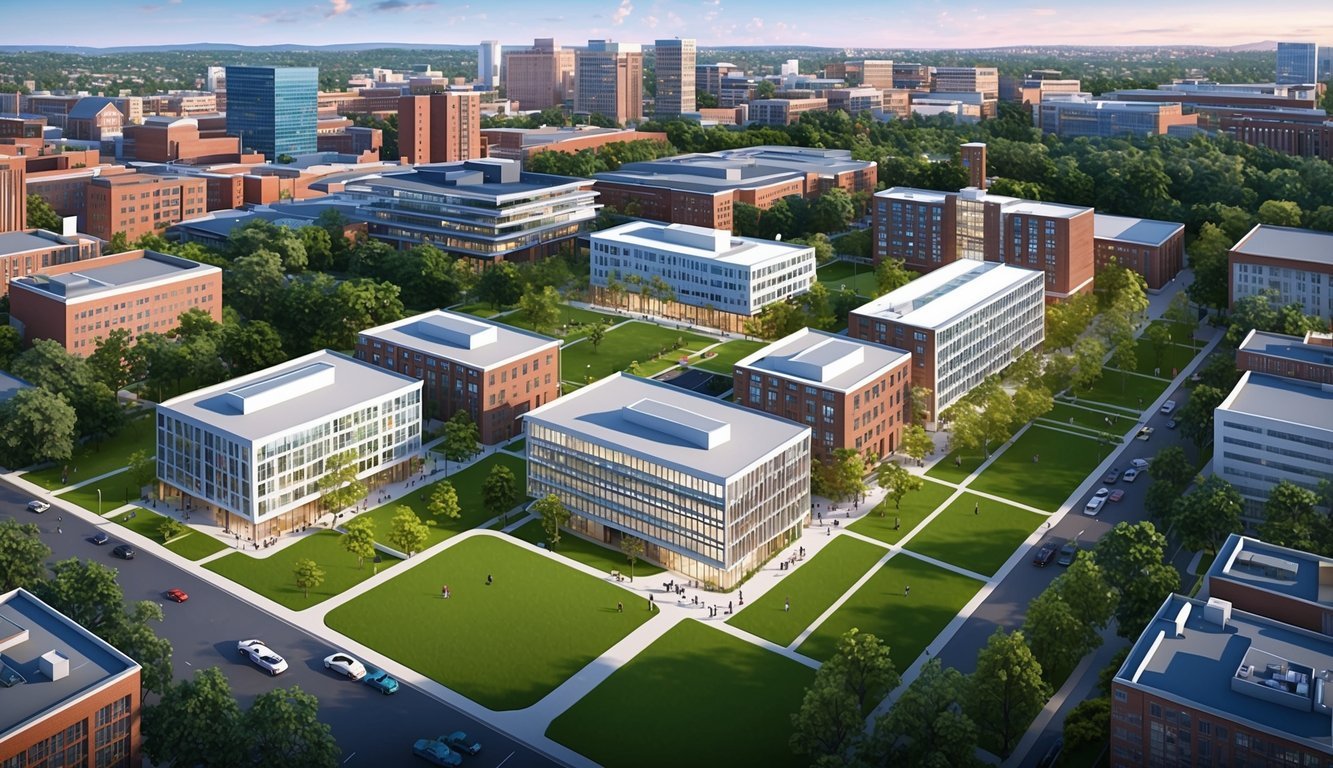Finding the right educational program to become a Family Nurse Practitioner (FNP) can greatly influence your career in advanced practice nursing.
Programs near you offer vital training in primary care, equipping you with the skills needed for effective health promotion and patient management.
As you explore your options, consider factors such as program length, accreditation, and the types of clinical experiences available.
Many institutions provide flexible online and hybrid courses, making it easier to balance your studies with other commitments.
Look for programs that emphasize hands-on learning and clinical simulations to ensure you are well-prepared for real-world challenges.
Resources like U.S. News & World Report can provide valuable insights into the top FNP programs nationwide.
Additionally, understanding local job markets can help you choose a program that aligns with your career goals.
Research the average FNP salary and demand in your area to make an informed decision about your education and future employment opportunities.
Understanding FNP Programs
Family Nurse Practitioner (FNP) programs equip you with essential skills and knowledge for providing comprehensive healthcare.
These programs include focused curriculum components, specialized training in family care, and accreditation standards that ensure quality education.
Core Curriculum
In FNP programs, the Core Curriculum typically encompasses subjects critical to advanced nursing practice.
Key courses include:
- Pathophysiology: Understanding disease processes.
- Advanced Physiology and Pathophysiology: Delving deeper into bodily functions and disorders.
- Advanced Pharmacology: Learning medication management and pharmacotherapy.
You will also engage in Health Assessment courses that teach you to evaluate patient health comprehensively.
These foundational courses prepare you for clinical practice, emphasizing diagnostic skills and evidence-based care.
Many programs offer a Master of Science in Nursing (MSN) degree, enhancing your qualifications in advanced nursing practice.
Specialized Family Care Training
The Specialized Family Care Training within FNP programs prepares you to meet the health needs of patients across the lifespan.
This training emphasizes:
- Diagnosis and Management: Developing the ability to diagnose various conditions.
- Clinical Hours: Gaining hands-on experience through direct patient care.
You will learn to provide preventive care, manage chronic illnesses, and treat acute health issues, all tailored to family-centered approaches.
Programs often incorporate simulations and clinical placements to refine your practical skills in real-world settings.
Accreditation and Educational Standards
Ensuring you choose an accredited program is vital for your education.
Accredited programs, such as those recognized by CCNE (Commission on Collegiate Nursing Education), adhere to rigorous standards of nursing education.
These standards guarantee that you receive quality education and training necessary for your role as an FNP.
Additionally, ensure the program offers comprehensive coursework and clinical opportunities.
This focus helps you acquire the competencies required for effective patient care and professional practice within the healthcare system.
Prerequisites and Admission Criteria

When considering family nurse practitioner programs, it’s essential to understand the prerequisites and admission criteria.
These requirements typically cover educational qualifications, relevant work experience, and necessary application materials.
Educational Background
To apply for a family nurse practitioner program, you generally need a Bachelor of Science in Nursing (BSN).
This degree provides the foundational knowledge required for advanced practice nursing.
Some programs may accept nurses with an Associate’s Degree in Nursing (ADN) if they are enrolled in a bridge program to earn a BSN.
You will also need to hold a Master of Science in Nursing (MSN) degree for most advanced practice roles.
A statistics course is often required, as it equips you with the skills needed for data analysis in healthcare settings.
Be sure to check specific program requirements, as they can vary widely.
Work Experience and RN License
Having a valid, unencumbered Registered Nurse (RN) license is crucial.
This licensure demonstrates your capability to practice nursing and is a prerequisite for enrollment.
Many programs require at least one to two years of clinical experience as an RN, particularly in areas relevant to family practice, such as pediatrics or adult care.
Practicing in a hands-on environment helps develop skills that are essential for advanced practice roles.
Programs might also seek candidates who have experience in leadership or specialized nursing areas that enhance their understanding of patient care dynamics.
Application Materials
When applying, you’ll need to submit several key documents.
These typically include:
- Official Transcripts: Provide proof of your educational background from accredited institutions.
- Letters of Recommendation: Usually, two to three professional or academic references who can attest to your qualifications and character are required.
- Personal Statement: A narrative detailing your reasons for pursuing the program and your career goals.
Always verify specific application requirements for your chosen program, as they may have unique stipulations or forms required for submission.
Program Structures and Delivery

Understanding the program structures and delivery modes of family nurse practitioner programs will help you choose a path that fits your lifestyle and career goals.
Different formats and tracks cater to varying needs and allow for tailored learning experiences.
Online and On-Campus Options
Family nurse practitioner (FNP) programs offer a mix of online and on-campus options to accommodate diverse learning preferences.
Online Nurse Practitioner Programs allow you to complete theoretical coursework at your own pace, often through virtual classrooms and learning management systems.
This flexibility is beneficial for working professionals.
On-campus components provide hands-on training and valuable networking opportunities.
Schools may require periodic attendance for labs, workshops, or seminars.
Some institutions, such as Thomas Jefferson University, effectively blend these formats to enhance learning outcomes.
This approach ensures you receive comprehensive education while balancing personal and professional commitments.
Full-Time and Part-Time Tracks
When exploring FNP programs, you’ll discover both full-time and part-time tracks.
Full-time students typically complete the program in a shorter duration, allowing quicker entry into the workforce.
This option may be suitable if you can commit to a rigorous schedule.
Part-time tracks offer greater flexibility, enabling you to balance work and academic responsibilities.
This is ideal for those who need to maintain employment while pursuing their NP degree.
Regardless of the track you choose, ensure that it aligns with your career aspirations and personal circumstances.
Clinical Rotation and Immersion Experiences
Clinical rotations are a critical component of FNP training.
These experiences allow you to apply your theoretical knowledge in real healthcare settings.
Most programs require a specific number of practice hours, ensuring you gain hands-on experience with diverse patient populations.
Immersion experiences further enhance your training by placing you in concentrated clinical settings.
Opportunities may include pediatric primary care and specialty clinics, providing exposure to various practice models.
Schools often partner with local clinical sites to facilitate these rotations.
Engaging actively in these experiences is essential for developing your skills and confidence as a nurse practitioner.
Financial Considerations

When enrolling in family nurse practitioner programs, it is crucial to evaluate tuition costs, available financial aid options, and the long-term financial benefits of your investment.
Understanding these elements can help you make informed decisions regarding your education and future career.
Tuition and Fees
Tuition rates for family nurse practitioner programs vary widely based on institution, format, and residency status.
On average, you can expect to pay between $20,000 and $60,000 for the entire program.
| Institution Type | Estimated Tuition Range |
|---|---|
| Public Universities | $20,000 – $40,000 |
| Private Universities | $30,000 – $60,000 |
| Online Programs | $15,000 – $50,000 |
In addition to tuition, you may incur fees for textbooks, technology, and clinical placements.
It’s essential to budget for these additional expenses to gain a comprehensive understanding of the total cost of your education.
Available Financial Aid and Scholarships
Financial aid can significantly alleviate the economic burden of your education.
Various options include federal and state grants, loans, and institutional scholarships.
- Federal Financial Aid: Fill out the FAFSA to determine your eligibility for Pell Grants and federal loans.
- Scholarships: Many universities offer scholarships specifically for nursing students. Research options such as the American Association of Colleges of Nursing (AACN) scholarships.
- Grants: Some organizations provide grants that do not require repayment, such as the HRSA Nurse Corps Scholarship Program.
Consult your chosen institution’s financial aid office for personalized guidance on available resources.
Investment and Long-Term Gains
Pursuing a family nurse practitioner degree is a considerable investment that can yield significant long-term benefits.
According to the U.S. Bureau of Labor Statistics, the median salary for nurse practitioners is approximately $125,900 annually.
Factors influencing your potential earnings include:
- Location: Some states and regions offer higher salaries due to demand.
- Experience: As you gain experience, your earning potential is likely to increase.
- Specialization: Focusing on a niche area within nursing can enhance your marketability and salary.
Investing in your education yields not only immediate skills but also opens doors to advanced career opportunities and financial stability.
Career and Certification Outcomes

As you advance in your journey to become a Family Nurse Practitioner (FNP), understanding licensure, certification, and career prospects is essential.
This section covers the critical areas you need to navigate successfully in your professional development.
Licensure and Certification
To practice as a Family Nurse Practitioner, you must obtain the appropriate nursing licensure and certification.
After completing an accredited program, you can apply for state licensure, which typically requires passing the NCLEX-RN exam.
Once licensed, you can pursue certification as a Family Nurse Practitioner.
The American Academy of Nurse Practitioners (AANP) and the American Nurses Credentialing Center (ANCC) offer certification examinations.
Successfully passing one of these exams grants you the title of FNP, allowing you to provide patient-centered care across diverse healthcare settings.
Regular renewal is necessary to maintain your certification and stay updated with practice standards.
Scope of Practice and Employment Settings
As a Family Nurse Practitioner, your scope of practice can vary by state and encompasses a wide range of responsibilities.
You may provide primary care, manage chronic illnesses, perform physical exams, and prescribe medications.
Common employment settings include hospitals, private practices, community health clinics, and urgent care facilities.
Many FNPs focus on preventative care, working to enhance patient wellness and health education.
The demand for primary care providers continues to grow, presenting a favorable career outlook for FNPs in various healthcare settings.
Continuing Education and Advancement
Maintaining your certification and keeping up with advancements in medical practice requires continuing education.
Engaging in professional development opportunities, including conferences, workshops, and online courses, is essential.
These activities often count toward your required continuing education units (CEUs).
Pursuing a Doctor of Nursing Practice (DNP) can open doors for leadership roles, academic positions, or advanced clinical practice opportunities.
Staying informed through professional organizations, like the AANP, enhances your career trajectory and ensures you deliver high-quality care to your patients.

